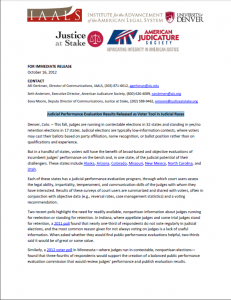Press Release: Judicial Performance Evaluation Results Released as Voter Tool in Judicial Races (Updated)
 This fall, judges are running in contestable elections in 32 states and standing in yes/no retention elections in 17 states. Judicial elections are typically low-information contests, where voters may cast their ballots based on party affiliation, name recognition, or ballot position rather than on qualifications and experience.
This fall, judges are running in contestable elections in 32 states and standing in yes/no retention elections in 17 states. Judicial elections are typically low-information contests, where voters may cast their ballots based on party affiliation, name recognition, or ballot position rather than on qualifications and experience.
But in a handful of states, voters will have the benefit of broad-based and objective evaluations of incumbent judges’ performance on the bench and, in one state, of the judicial potential of their challengers. These states include Alaska, Arizona, Colorado, Missouri, New Mexico, North Carolina, and Utah.
Each of these states has a judicial performance evaluation program, through which court users assess the legal ability, impartiality, temperament, and communication skills of the judges with whom they have interacted. Results of these surveys of court users are summarized and shared with voters, often in conjunction with objective data (e.g., reversal rates, case management statistics) and a voting recommendation.
Two recent polls highlight the need for readily available, nonpartisan information about judges running for reelection or standing for retention. In Indiana, where appellate judges and some trial judges stand for retention, a 2011 poll found that nearly one-third of respondents do not vote regularly in judicial elections, and the most common reason given for not always voting on judges is a lack of useful information. When asked whether they would find public performance evaluations helpful, two-thirds said it would be of great or some value.
Similarly, a 2012 voter poll in Minnesota—where judges run in contestable, nonpartisan elections—found that three-fourths of respondents would support the creation of a balanced public performance evaluation commission that would review judges’ performance and publish evaluation results.
“These polling results demonstrate that voters need more information to make informed decisions about the judges appearing on their ballots,” said Dr. Malia Reddick, director of the IAALS Quality Judges Initiative. “Judicial performance evaluation programs fill this void.”
“For more than three decades, the American Judicature Society has supported the use of judicial performance evaluation programs as a valuable informational tool for voters in judicial retention elections,” said AJS Executive Director Seth S. Andersen. “Surveys and exit polling demonstrate that voters use JPE results to make better-informed decisions on judges standing for retention. The key is to ensure that evaluation results are disseminated widely and are readily available to voters.”
“To be fair and impartial, judges must be protected from special interest and partisan influence while remaining accountable to the law and constitution,” said Bert Brandenburg, Executive Director of Justice at Stake. “By focusing on competence instead of ideology, JPE’s enable the public to choose fair, high-quality judges.”
CONTACT
Alli Gerkman, Director of Communications, IAALS, (303) 871-6612, agerkman@du.edu
Seth Andersen, Executive Director, American Judicature Society, (800) 626-4089, sandersen@ajs.org
Eeva Moore, Deputy Director of Communications, Justice at Stake, (202) 588-9462, emoore@justiceatstake.orgJudicial
# # #
IAALS is a national, independent research center dedicated to continuous improvement of the process and culture of the civil justice system. By leveraging a unique blend of empirical and legal research, innovative solutions, broad-based collaboration, communications, and ongoing measurement in strategically selected, high-impact areas, IAALS is empowering others with the knowledge, models, and will to advance a more accessible, efficient, and accountable civil justice system.
Founded in 1913, the American Judicature Society is a nonpartisan organization with a national membership of judges, lawyers, and other citizens interested in improving our nation's courts and the administration of justice. The AJS mission is to secure and promote an independent and qualified judiciary and a fair system of justice. For more information, please visit our website at www.ajs.org.
Justice at Stake is a nonpartisan, nonprofit campaign working to keep America’s courts fair and impartial. Justice at Stake and its 50-plus state and national partners educate the public, and work for reforms to keep politics and special interests out of the courtroom – so judges can protect our Constitution, our rights and the Rule of Law. The positions and policies of Justice at Stake partners and board members are their own. For more about Justice at Stake, go to www.justiceatstake.org, or www.gavelgrab.org.
**Updated**
See Also:


